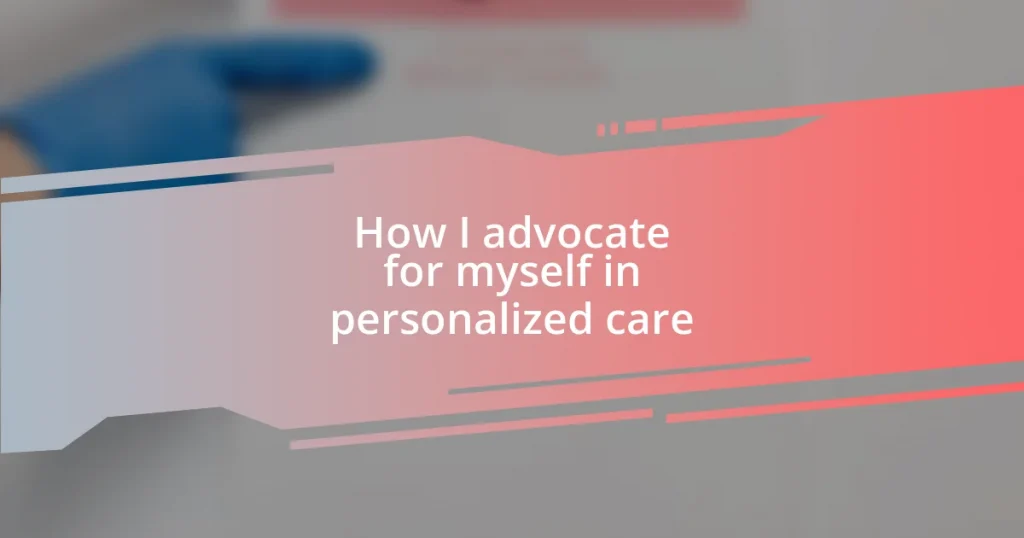Key takeaways:
- Personalized care emphasizes treating patients as unique individuals by understanding their specific circumstances, preferences, and values, enhancing trust and communication with healthcare providers.
- Effective self-advocacy involves clearly identifying healthcare needs through reflection on symptoms, setting clear health goals, and openly communicating with providers, ensuring tailored care and support.
- Building a support network, both personally and through online communities, is vital for navigating health challenges, offering emotional support and shared experiences that empower personal care advocacy.
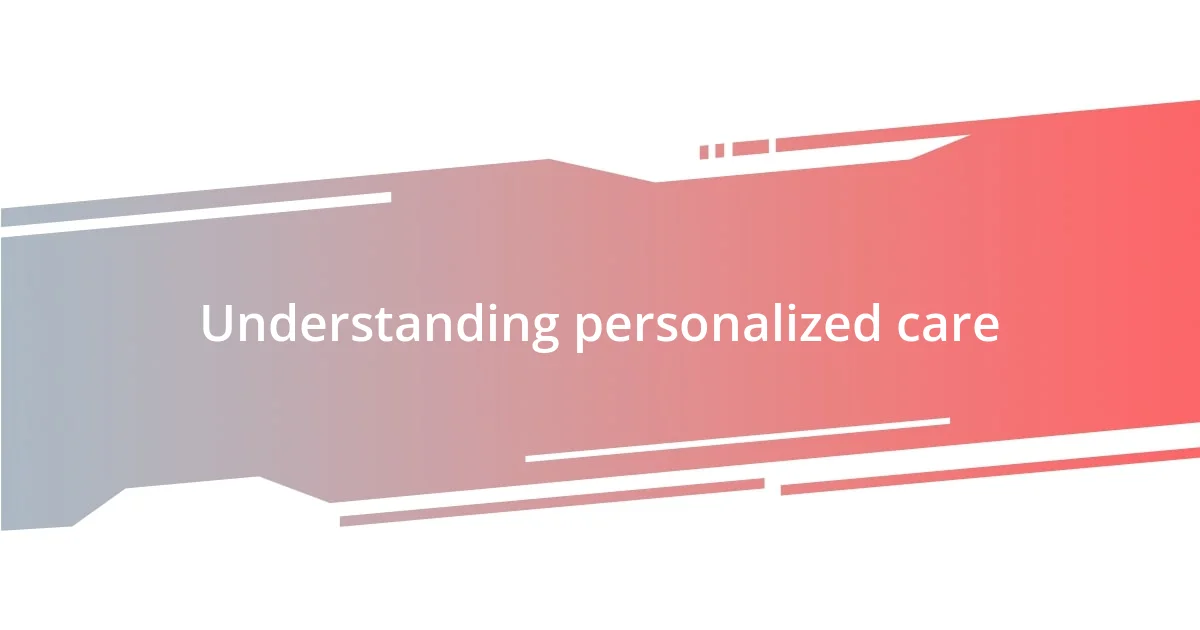
Understanding personalized care
Personalized care is about treating patients as individuals rather than a collection of symptoms. I remember a time when I was overwhelmed by a one-size-fits-all treatment plan that didn’t resonate with my needs. It made me wonder—how can we truly heal if we aren’t seen as unique individuals with our own stories?
At its core, personalized care involves understanding each patient’s specific circumstances, preferences, and values. I once had a nurse who took the time to chat with me about my lifestyle and what mattered most to me. That little conversation made a world of difference; I felt like my care was tailored just for me.
Ultimately, personalized care empowers patients to take an active role in their healthcare journey. Have you ever felt dismissed by a healthcare provider? I have, and I found it essential to voice my concerns and advocate for myself. This approach not only enhances the quality of care but also fosters a trusting relationship between patients and providers.
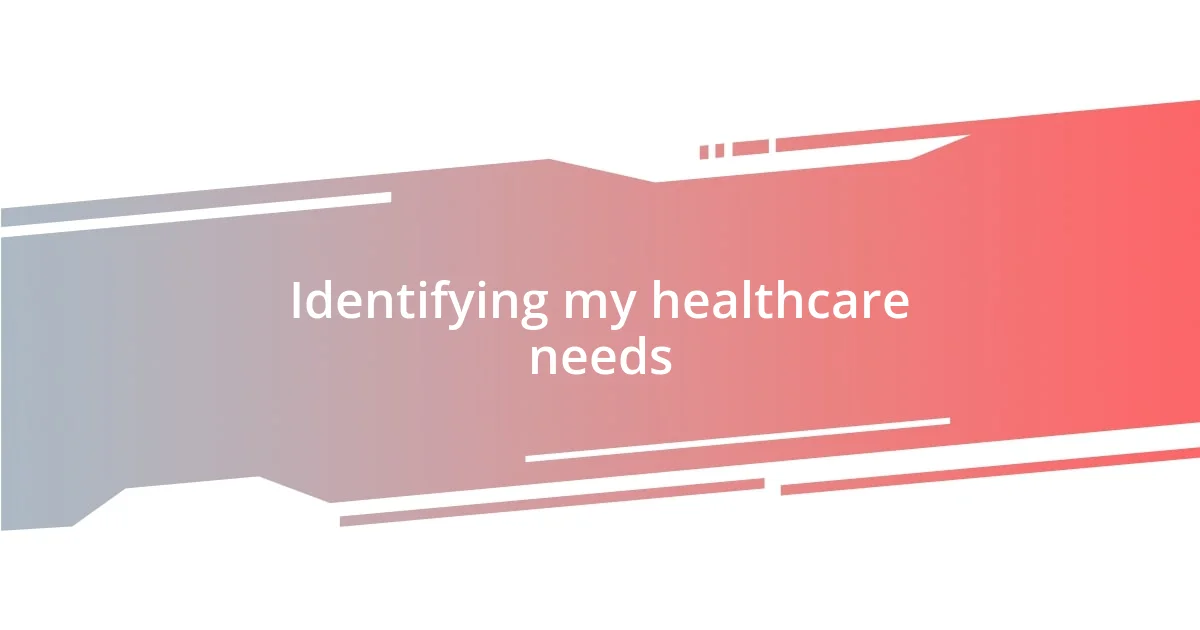
Identifying my healthcare needs
Identifying my healthcare needs can sometimes feel like piecing together a puzzle. I think back to a time when I faced chronic fatigue and struggled to explain its impact on my daily life. After several appointments, it struck me that I wasn’t just another patient; I needed to articulate my struggles clearly. It’s essential to reflect on my symptoms and how they intersect with my lifestyle to truly convey my needs.
Here are a few strategies I use to identify my healthcare needs:
- Reflect on Symptoms: I make a list of symptoms I experience, noting their frequency and intensity—this helped me communicate my condition effectively.
- Understand My Lifestyle: I consider factors like my diet, exercise, and stress levels; these aspects weave into my health.
- Set Goals: I think about what I want from my healthcare—whether it’s pain relief, improved energy, or managing certain conditions, having clear goals guides my conversations with providers.
- Seek Feedback: I value input from my friends and family; discussing my health with them gives me different perspectives I might overlook.
- Educate Myself: Researching my conditions and available treatments empowers me to ask informed questions during my appointments.
By engaging in this thought process, I feel more equipped to advocate for the personalized care I deserve.

Setting clear health goals
Setting clear health goals is a vital step in my advocacy journey. I remember feeling lost during a period of treatment when I didn’t know what I wanted to achieve. One day, a doctor asked me about my priorities, and it struck me—how can we expect to make progress without knowing our destination? Since then, I’ve embraced the practice of defining specific, measurable, and realistic health goals. If I want to improve my energy levels, for example, I set a goal to walk 30 minutes a day, five times a week.
When I think about setting these goals, I realize they need to resonate with my personal values. I once aimed for weight loss because I thought it was expected, only to find that focusing on building strength felt more fulfilling. It’s important to ask ourselves what truly matters and to align our goals with our authentic selves. I encourage you to take a moment to reflect. What is it that you genuinely wish to achieve for your health?
Additionally, I often document my goals, which keeps me accountable. At the end of each month, I review my progress and adjust my objectives as necessary. For instance, if stepping up my exercise routine becomes overwhelming, I scale back and focus on what feels right. This adaptable approach makes my health journey less daunting and more tailored to who I am.
| Traits of Clear Health Goals | Examples |
|---|---|
| Specific | I want to lower my cholesterol by 20 points in six months. |
| Measurable | I will track my daily fruit and vegetable intake to reach five servings each day. |
| Achievable | I commit to a 10-minute daily meditation practice to reduce stress. |
| Relevant | Improving my sleep quality is important for my overall energy levels. |
| Time-bound | I aim to lose 5 pounds by the end of the next month. |

Communicating effectively with providers
Communicating effectively with healthcare providers is crucial in my journey. I’ve learned that pinpointing my concerns upfront really sets the tone for each appointment. In one instance, I approached a specialist with a laundry list of symptoms, and while it felt overwhelming, I noticed the way their eyes lit up. It was as if I had opened the door to a more collaborative conversation. How do you think your symptoms influence your provider’s understanding of your health?
Another strategy that has served me well is asking open-ended questions. Instead of merely asking, “Is this treatment right for me?” I now say, “What are the potential benefits and risks of this treatment in my specific situation?” This shift invites a deeper discussion and allows me to feel more connected to my care. I still remember a moment when a provider shared insights I hadn’t considered, simply because I opened the floodgates for dialogue. It’s an empowering experience when you realize your voice can guide the path of your care.
Lastly, I find it important to express my feelings during these conversations. Sharing how a diagnosis impacts my emotional well-being creates a more holistic picture of my health. I once candidly told a provider how anxiety around my condition kept me up at night. Their response was immediate and caring; it transformed that appointment into a nurturing space. Have you ever thought about how sharing your emotions might deepens your relationship with your healthcare team? When I take that step, it invites empathy and illustrates that my health isn’t just about numbers and symptoms; it’s about me, the person navigating this journey.
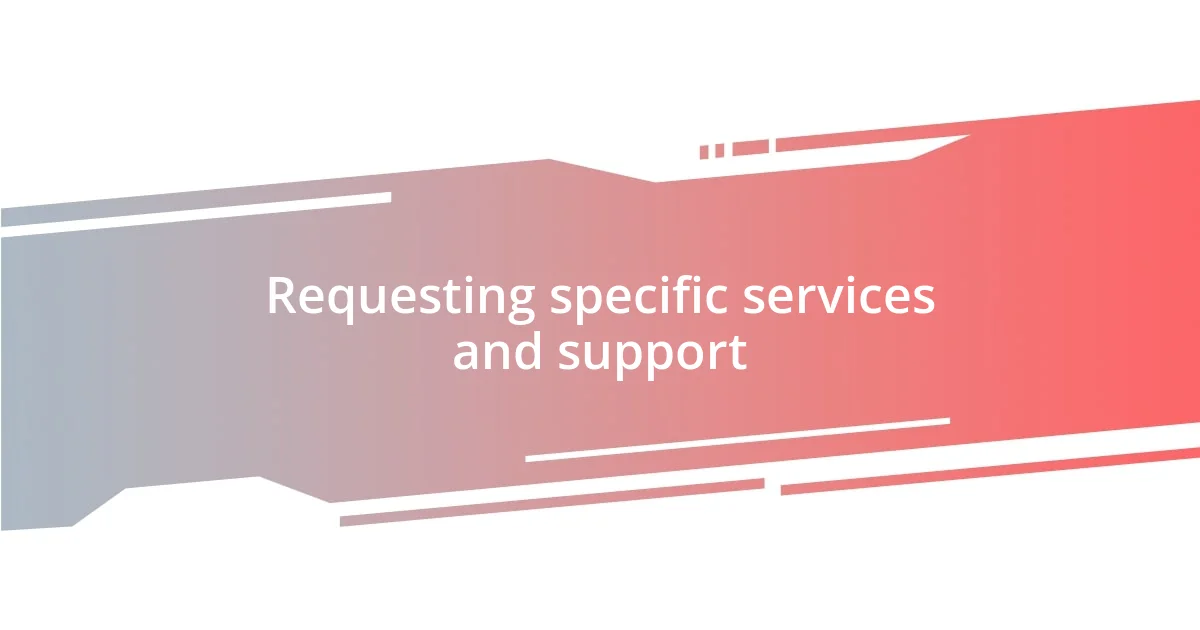
Requesting specific services and support
When it comes to requesting specific services and support, I find that being direct is key. During one visit, I knew I needed help managing the side effects of my medication, but it felt daunting to bring it up. I remember sitting in the waiting room, rehearsing what I would say, and then it hit me: why not just ask for what I need? So, I confidently expressed my concerns, and to my surprise, the doctor not only listened but also provided options I had never considered. Have you ever hesitated to voice your needs? Trust me, it’s worth it.
Another strategy I’ve adopted involves preparing for my appointments with a list of services I think might help enhance my care. Whether it’s physical therapy, counseling, or nutritional advice, being equipped with this information allows me to advocate for myself effectively. There was a moment when I found myself feeling overwhelmed and unsure about my treatment plan. I laid out my thoughts on paper, and presenting them during a check-in led to a fruitful discussion about tailoring my care. It created an environment where my needs were front and center. What personal insights can you bring to your next appointment?
Lastly, I’ve learned to follow up on my requests. After asking for a referral to a specialist, I made it a point to check back with my healthcare provider about it. I remember sensing a subtle shift in our dynamic; being proactive showed my commitment to my health. Plus, it reaffirmed my belief that my voice matters in this process. So, how do you stay engaged with your healthcare team? For me, regular communication has made all the difference in receiving the support I need to thrive.
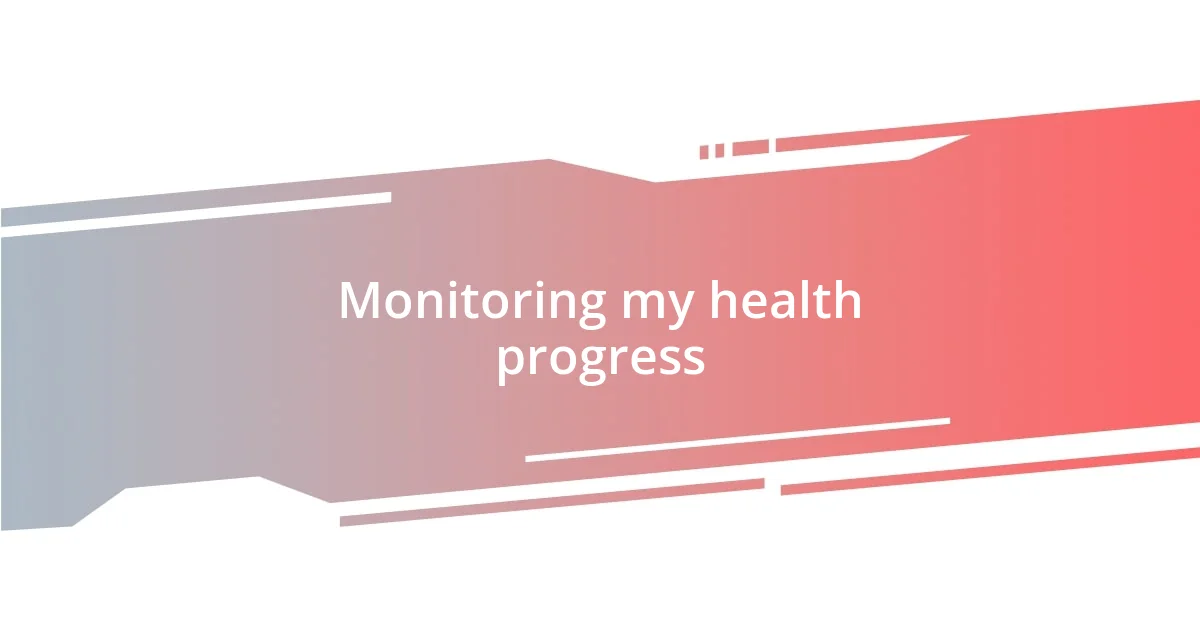
Monitoring my health progress
Monitoring my health progress is something I take seriously. I’ve found that keeping a journal has been incredibly beneficial. Every week, I jot down my symptoms, medication effects, and even how I feel emotionally. The other day, I glanced back at my notes and noticed a pattern: certain foods triggered my discomfort. It’s these small insights that empower me to take actionable steps and communicate them to my healthcare team. Have you ever considered how documenting your experiences might illuminate your health journey?
Another vital aspect has been tracking my lab results over time. I remember receiving my cholesterol levels; at first, I felt anxious, but as I documented my numbers, I recognized trends. Instead of viewing the results as mere figures, they became part of my story. I noticed when I made specific lifestyle changes, like increasing exercise, my numbers positively shifted. I now advocate for myself by asking my provider to explain these results in context, which makes me feel much more connected to my health outcomes.
Lastly, I embrace the power of technology in monitoring my health. Utilizing apps to track my daily habits and symptoms enables me to visualize my progress. I recently hit a milestone where I noticed a significant improvement in my mood over a few months. I was thrilled! It’s like having a personal coach cheering you on. When I shared this with my provider, they were equally excited and proposed strategies to build on this progress. Have you thought about how tech could enhance your self-monitoring efforts? For me, being proactive with technology has been a game-changer in my health journey.

Building a support network
Building a support network has been crucial for me in navigating my healthcare journey. I recall a time when I felt truly lost and overwhelmed by my health challenges. It was during this period that I reached out to friends and family, sharing my fears and uncertainties. To my surprise, they rallied around me, offering both emotional support and practical advice that I had never considered before. Have you thought about how the people in your life might help you advocate for your own care?
I’ve also discovered the value of connecting with support groups, both online and in-person. I remember attending a local meeting where I met individuals with similar experiences. Listening to their stories not only made me feel less isolated but also provided me with strategies that I could implement in my own care. There’s something empowering about hearing others’ success stories—like a light at the end of the tunnel. Have you explored support groups outside of your immediate circle?
Lastly, I’ve learned to leverage social media for building a broader support network. By following health forums and connecting with advocates online, I’ve found a wealth of knowledge at my fingertips. One day, I came across someone’s post about navigating the complexities of medication changes. It sparked a conversation that led to invaluable insights I hadn’t encountered during my appointments. Does social media play a role in how you seek out information and support? For me, engaging online has broadened my understanding of personalized care dramatically.










